STORIES

Celebrating
Tony G


Football
Dec 10' 2025
Celebrating Humility & Discipline Anthony Gordon.
Born on 24 February 2001 in Liverpool in a working-class neighbourhood, Anthony Michael Gordon entered the world with a dream. One that many children in football-mad Liverpool silently nurture. His parents, Nadine Gordon and Keith Gordon, can hardly have imagined just how high their boy would climb, starting from street games in Kirkdale to ripping defences in the Premier League. Anthony grew up in a humble household. His family was supportive, but resources were limited. Nadine and Keith sacrificed much time, money, comfort to fuel his passion for football. Keith often coached Anthony in the evenings, after work, while Nadine drove him to training and matches. Their belief never wavered, even when the path ahead looked uncertain. Despite their support, Anthony’s early journey was not easy. He began at the grassroots club Whiston Juniors, then spent time on the books of Liverpool FC as a youngster. But when that door didn’t open, he had to pivot. He joined the academy of Everton FC at age 11 - a significant step. That change meant adapting to new environments and proving himself all over again, but Anthony’s resilience shone through. Breaking into professional football is rarely smooth. Anthony made his senior debut for Everton in December 2017, in a Europa League match - an accomplishment that many dream of, but few achieve at the age of 16. Yet for all the promise, there were challenges: long hours of training, waiting for opportunities, moments of doubt, and the pressure of expectations from both club and self. He persevered. Over the years, Anthony gradually earned his place, pushing through youth teams, under-23 matches and substitutes' benches until he became a regular. His growth was steady, shaped by hard work, dedication, and an unquenchable hunger to improve. In January 2023, Anthony made a bold leap: he signed for Newcastle United FC. It was a statement. A chance to push boundaries, fulfil potential, and rewrite his story. At Newcastle, the environment, coaching, and his own commitment came together. The move proved transformational - he began to shine on a bigger stage, demonstrating speed, creativity and attacking flair that quickly caught the eye. But success wasn’t handed on a platter. Even at Newcastle, Anthony faced challenges: adjusting to new demands, high expectations, and pressure. What helped was the network around him: coaches, senior teammates, support staff, and above all, the values instilled by his parents - humility, discipline, and mental strength. Family sacrifices, sleepless nights on training fields, and unwavering belief in him began to pay off. His rise did not stop at club level. With notable performances, he earned a call-up to the senior squad of England national football team. In March 2024, Anthony made his debut against top opposition. It was a moment that vindicated years of struggle, rejection, injury risks, and constant competition. Today, Anthony Gordon stands as proof that talent alone is not enough. What matters is the journey: humble beginnings, persistent effort, belief, support, resilience and seizing opportunities when they arrive. His story resonates deeply especially for young players dreaming big but lacking access, connections, or resources. For a platform like 8lete - which aims to nurture young athletes, guide their growth and offer supportive structures. Anthony’s journey offers powerful lessons. 8lete can provide mentorship, training plans, mental coaching, and emotional support that mirror what Nadine and Keith gave Anthony. 8lete can bridge gaps for those whose families might not afford expensive training, helping them sharpen both skill and mindset. In a world where many abandon their dreams due to lack of support or guidance, 8lete can be the missing pillar - offering structured pathways, peer support, coaching, and motivation. If a boy from working-class Liverpool, with humble roots and loving parents, can rise to shine on the world stage, then thousands like him elsewhere around the globe.
READ MORE

Celebrating
Semenyo
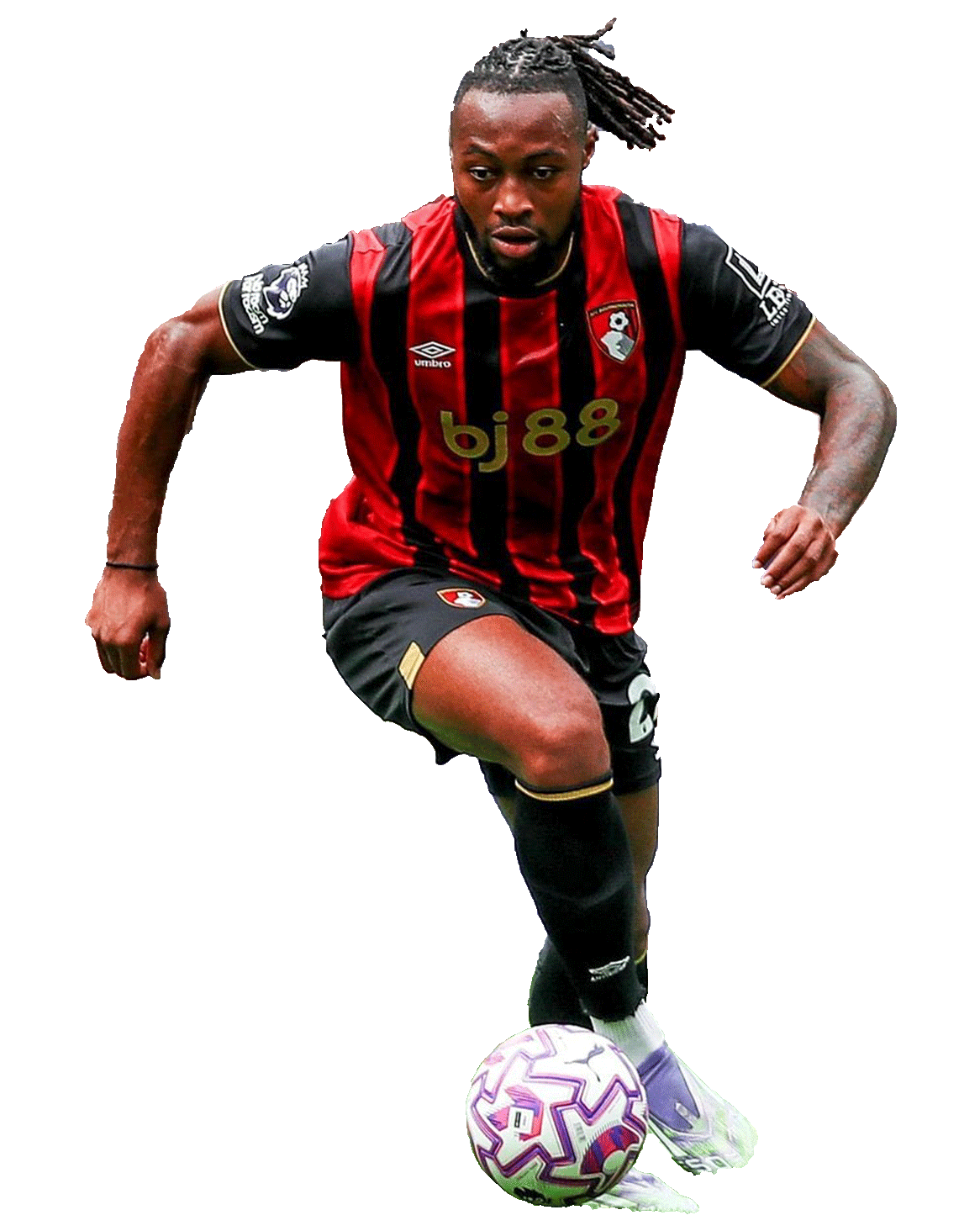

Football
Dec 05' 2025
Celebrating Grit & Humility Antoine Semenyo.
Born on 7 January 2000 in London, England, Antoine Serlom Semenyo carries the hopes of Ghanaian heritage through his father, and European roots through his mother. His father, Larry Semenyo, was once a midfielder for Okwawu United in Ghana’s domestic league, while his mother holds French nationality. Growing up in a family with deep football roots, Antoine also has a younger brother, Jai Semenyo, who has followed in his footsteps into professional football. From a young age, Antoine played grassroots football in South London. He wasn’t part of any high-profile academy rather, he played in local Sunday-league teams and for lower-tier youth clubs. This early path, while humble, helped him nurture natural talent and love for the sport. But his early ambitions met harsh resistance. Between the ages of 14 and 15, Antoine faced repeated rejections from top English clubs including Arsenal FC, Tottenham Hotspur, Crystal Palace FC and others. An especially painful moment came after an eight-week trial at Crystal Palace, where he was ultimately told he wasn’t good enough. That rejection hit him hard so much so that he temporarily quit football altogether. During this dark phase, Antoine’s family became his rock. Larry and his wife provided emotional support and encouraged him not to give up on his dream. Their faith in him laid the foundation for his comeback. At 16, summoned by determination and with the encouragement of his parents, he enrolled at the South Gloucestershire and Stroud College (SGS) near Bristol. There, under the guidance of coach Dave Hockaday, and with intense self-training and discipline, Antoine transformed - shedding earlier doubts, reshaping his fitness, and rediscovering his passion. His breakout season at college where he reportedly scored around 50 goals - caught the attention of pro scouts. In 2017 he signed for Bristol City F.C.’s academy. It was a small step, but a meaningful one: from Sunday-league obscurity to structured youth development. After progressing through youth and U23 setups and excelling on loan spells at lower-tier clubs, Antoine made his professional debut in January 2018. At Bristol City, he gradually proved himself. By 2021 he had earned “Young Player of the Year” and started to draw serious interest. In January 2023, he secured a move to AFC Bournemouth for around £10 million - a turning point that would propel him into the spotlight of the Premier League. Internationally, Antoine embraced his Ghanaian roots fully. In May 2022 he received his first call-up to the Ghana national football team (Black Stars). His first international goal came in a friendly before the 2022 World Cup. Representing Ghana was more than just a career milestone - it was a dream rooted in heritage and identity. But perhaps the defining chapter of his journey has unfurled in the 2025-26 season. Under manager Andoni Iraola at Bournemouth, Antoine has evolved into one of the most dangerous wingers in the league. His pace, two-footed finishing, dribbling and athleticism make him a constant threat. As of late 2025, he has already scored six goals and provided three assists - directly involved in over 80% of his team’s Premier League goals this season. Experts now consider him a candidate for “Premier League’s most valuable player.” In November 2025, despite facing racist abuse from the stands during a match at Anfield, Antoine responded not with despair but with performance: netting crucial goals and playing with the same intensity. Off the pitch, he has spoken about faith, family values, humility - foundations that have helped him stay grounded through success and adversity alike. Antoine Semenyo’s biography is not just of talent, but of resilience, reinvention, and faith. He transitioned from a rejected trialist at 15, a college footballer uncertain of his future, to a Premier League star representing his ancestral homeland. Throughout, his family especially his parents played a vital role. Coaches like Dave Hockaday and mentors at Bristol City gave him the structured environment and belief he needed. Loan spells, hard work, strict self-discipline, and refusal to give in to discouragement shaped his character. What his journey means and how 8lete can empower young dreamers At 8lete, we believe in identifying raw passion, nurturing it with structure, and guiding young athletes toward disciplined growth. Antoine’s story exemplifies exactly this. His rise shows that: - Early setbacks don’t define potential. - Family support and rooted identity matter. - Structured training environments and mentorship can transform raw talent. - Discipline, physical fitness, mental resilience, consistent work ethic can overcome early rejection. - Opportunity often comes to those who persist, adapt, and believe in themselves. For young players - whether in Ghana, or anywhere else - 8lete aims to build that supportive ecosystem. We want to offer mentorship, consistent coaching, holistic development (technical, physical, mental), and opportunities to shine when others may have given up. Just as Antoine turned a “no” into a golden “yes,” 8lete stands ready to help turn dreams into reality. Antoine Semenyo’s journey is a testament to grit, humility, and destiny - a beacon for every young athlete hoping to rise beyond circumstances.
READ MORE

Celebrating
Mr. Reliable
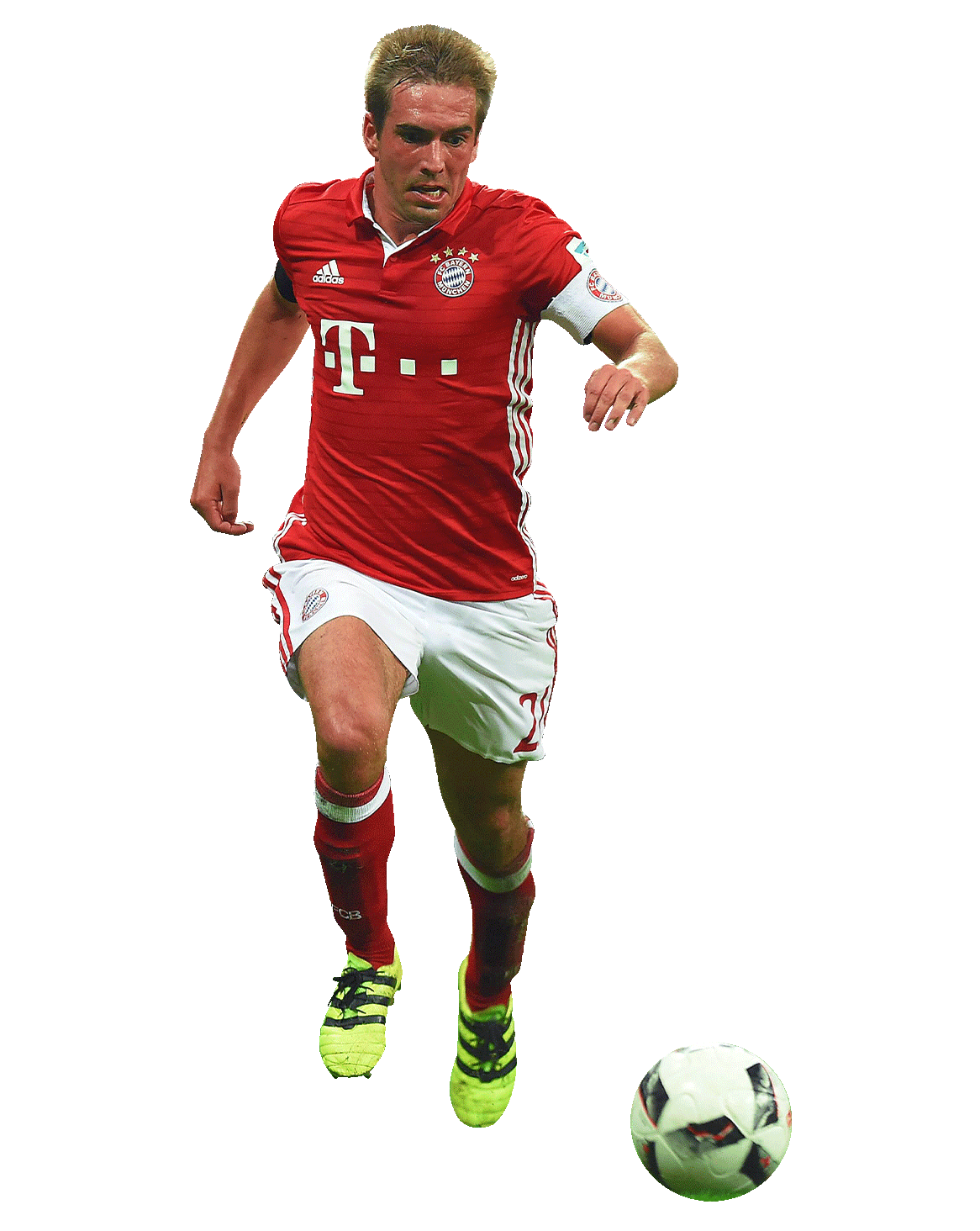

Football
Nov 11' 2025
Celebrating Dreams & Support Philipp Lahm.
When Philipp Lahm stepped onto the pitch as a young boy, he perhaps did not yet imagine how far his journey would carry him. Born on 11 November 1983 in Munich, West Germany, he grew up in a football-rich environment, one that set the foundation for a career defined by discipline, intelligence and quiet leadership. His parents played a subtle but essential role in that foundation. His father, Roland Lahm, had played amateur football with the local club FT Gern München, and his mother, Daniela Lahm, worked in the youth department of the same club. Although the details of his family’s finances aren’t spotlighted, the raw fact is that Philipp grew up in a typical Munich neighbourhood, loved the game of football, and was surrounded by people who valued sport and community. In his youth, Lahm joined FT Gern at a young age, motivated by his desire to succeed, and by age eleven he had already moved into the youth ranks of FC Bayern Munich - a massive step for any young player. But his journey was far from linear. He faced setbacks: one major one was a torn cruciate ligament just before his full return to Bayern’s first team in 2005, which forced him into rigorous rehabilitation and challenged his patience and mental strength. That moment, like many young players will encounter, highlights the essential truth: talent alone is not enough. The right mindset, the recovery, the humility and willingness to work through injury are just as critical. Lahm also had choices that tested his character. For example, in 2008 he reportedly rejected a lucrative move abroad to join Barcelona because he valued loyalty and wanted to grow at Bayern. This decision reflected something deeper: a commitment to build success where he started, rather than chase fame elsewhere. He trusted his process, trusted his club, and trusted his team. From this we learn the power of aligning purpose with place. During his career, he relied on many helpers: from his youth coaches who recognised his promise; to team-mates and mentors at Bayern and with Germany; to the support of his family and club behind the scenes. His long-time manager Pep Guardiola even called him “perhaps the most intelligent player I have ever coached”. These supporters enabled him to transition from youth prodigy to full-back, to national team captain, to world champion in 2014. Lahm’s rise isn’t about headline-grabbing flamboyance. It’s about consistent excellence, adaptability (he played left-back, right-back and even defensive midfield when needed) and quiet leadership. He became one of Germany’s most capped defenders, led his country to the 2014 FIFA World Cup trophy, and enjoyed a storied club career with over a decade at Bayern Munich. For young players following their dreams, this story offers several key take-aways: - Embrace your environment: Lahm didn’t wait for perfect conditions; he built within what he had (Munich, FT Gern, Bayern youth). - Work through setbacks: Injury, competition, positional change didn’t stop him — they reshaped him. - Align club, role, values: He stayed where he believed his development would thrive. - Leverage your support network: Coaches, mentors, family matter — nobody reaches the top alone. - Adapt and lead, even quietly: Leadership isn’t always loud; consistency, intelligence and trust can be just as powerful. Here is where the platform 8lete enters the picture. For young athletes who are chasing big dreams, 8lete can act as the bridge between raw potential and realised success - much like the network and environment Philipp Lahm found. Through structured training, mentorship, digital tools, club-player connectivity, and personalised pathways, 8lete empowers young athletes to build the kind of foundation Lahm built: a strong support system, clarity of purpose, adaptability, and performance resilience. Imagine a young footballer in Mumbai who sets his sights high and uses 8lete’s ecosystem to access skill development, mental resilience modules, performance tracking, mentor interactions, and peer community. It replicates on a micro-level what Lahm lived on a macro-level. In our increasingly competitive world, talent alone won’t suffice. Lahm’s story emphasises that: mindset, resilience, support, loyalty, and adaptation are equally important. And when you combine those with the right platform (8lete) to guide your growth, you multiply your chances of achieving the dream. As we draw this narrative to a close, remember: on 11 November 1983 a boy was born in Munich with big dreams and through hard work, support, smart decisions and perseverance he became a legend. That same blueprint is available to you now via 8lete. You may be in a different city, under different circumstances, but the principles remain the same. Your journey starts today. Use your support network. Accept the setbacks. Adapt your role. Stay loyal to your growth. Lead by example. And let 8lete help you transform from potential into performance.
READ MORE

Celebrating
Raum
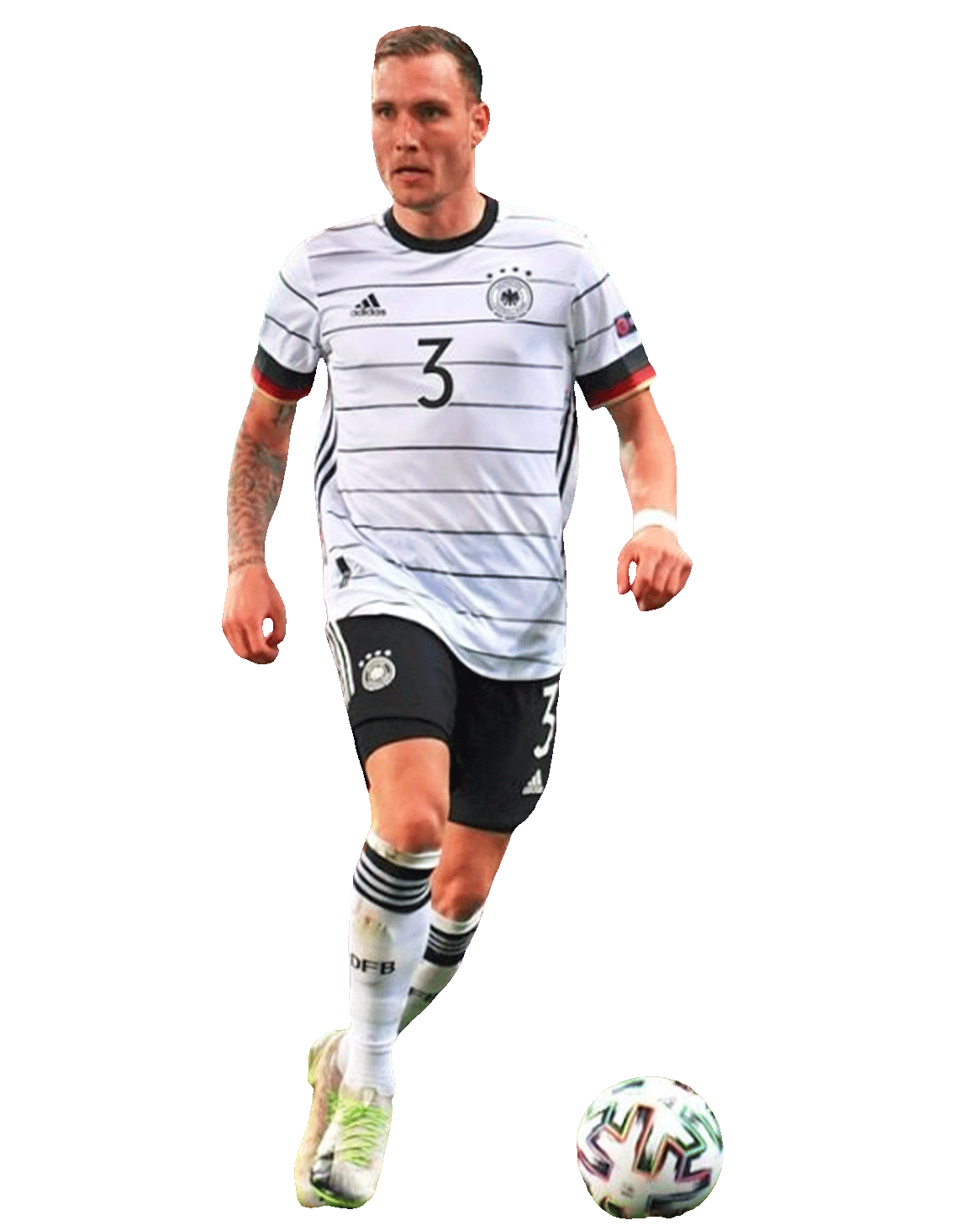

Football
Nov 05' 2025
Celebrating Grit & Perseverance David Raum.
Born on 22 April 1998 in Nürnberg, Germany, David Raum grew up with a dream that began in a local neighbourhood and would one day carry him to the highest levels of German football. From the moment he first kicked a ball as a child, the spark was lit. While we don’t have widely published details of his parents’ full names or life story, it is clear that David’s upbringing in a sporting and disciplined environment laid a foundation for his future success. At the age of eight, David was scouted and joined the youth academy of SpVgg Greuther Fürth after beginning his football with the local club Tuspo Nürnberg. That step was neither automatic nor easy: promising young athletes often face intense competition, high expectations from coaches and family, and the need to balance school and sport. This is the moment many dreams are challenged. David’s path was not a straight line to stardom. He had to work his way up through the youth divisions and make appearances in the senior sides of Greuther Fürth’s second team before earning his place in the first team. At times he was a substitute, at times he sought minutes on the pitch. Emotionally managing that uncertainty, keeping belief in himself, and surviving the pressure of performing each training session and match became part of his learning. For any young player, these are the defining hours of growth. With promotion to the Bundesliga and then a move to RB Leipzig on 31 July 2022 under a five-year deal, Raum stepped into a wider spotlight. At this stage he had built the physical attributes (1.81 m in height) and technical consistency required at elite level. But just as important was his mindset: he kept practicing free-kicks, improving his left-back role, and staying after training to refine what most skip. No athlete succeeds alone. David’s journey underlines the value of coaches who believed in him, teammates who pushed him, and the support system behind the scenes fitness staff, family, school mentors. While specific names of all these helpers aren’t always public, his own comments after scoring his first senior international goal reflect gratitude for those who stayed behind the scenes and emphasised hard work. For young players reading this: identify your team of helpers, stay loyal to them and allow them to challenge you, not just comfort you. On 10 October 2025, Raum scored his first goal for the German national team in a 4-0 win against Luxembourg coming from a direct free-kick. It was reward for years of persistence and training. He said he stayed after training to practise free-kicks. That goal marked a milestone not just statistically but emotionally: a young boy from Nürnberg, years of growth later, standing on the international stage. David’s story teaches a handful of key lessons: - Start early and stay consistent. He moved into structured youth football at eight and kept going. - Embrace the grind. The hours after everyone leaves the pitch, the extra practice, the mindset of continuous improvement. - Allow for setbacks. Being a substitute, having limited minutes, managing slow growth these are not failures, they are growth opportunities. - Surround yourself with a growth team. Coaches, family, teammates, support staff all part of your ecosystem. - Think big but act step by step. His move to the Bundesliga and then national team didn’t happen overnight but built on each stage before. Here is where the mission of 8lete becomes clear. For young athletes and clubs alike, 8lete offers a platform and ecosystem that mirror the support systems David benefited from. Whether it is coaching tools, club-player connectivity, career guidance, or performance analytics - 8lete aims to replicate the kind of structure that allowed Raum to succeed. If you are a young player, 8lete can help you set milestones, track progress, get feedback from mentors, and build your personal network of helpers just like David did. To every young player reading this: imagine your version of David’s journey. Your birthday deserves mention in your own narrative. Your hometown, your first club, your first big triumph. And then ask: who are my coaches, my mentors, my support system? Where do I sharpen my skills? Where do I get extra hours? Where do I handle setbacks? Use David’s path as inspiration: born in Nürnberg in 1998, rising to captain a top Bundesliga club and score for the national team. Your path might differ but the principles hold. David Raum’s life shows that talent matters, yes but talent without work and structure may not get far. The combination of early foundation, perseverance, supportive helpers, mindset and smart career moves creates momentum. 8lete is built for that journey: to offer young players the tools, community and structure to turn ambition into achievement. So whatever position you play, whatever club you represent take one more extra practice, believe in your growth, honour your support team and remember: your breakthrough may be around the corner. Use David’s story as fuel, and use 8lete as your platform.
READ MORE

Celebrating
Alex
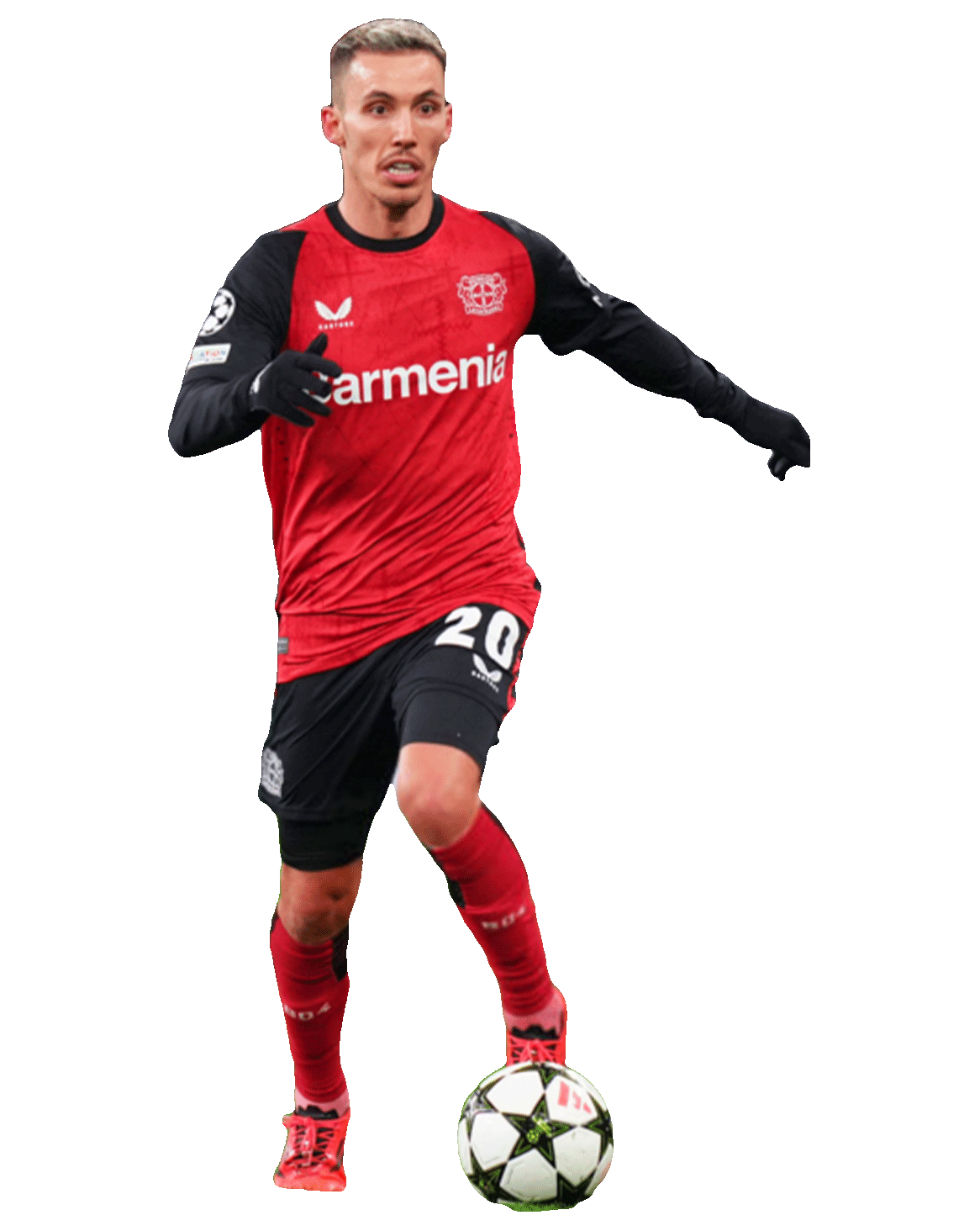

Football
Oct 29' 2025
Celebrating Talent & Perseverance Alejandro Grimaldo García.
When we look at the career of Alejandro Grimaldo García (born 20 September 1995) we see much more than a professional footballer. We see a story of resilience, ambition, support and strategic progression - a story that holds powerful lessons for any young athlete who dreams of making it. Born in Valencia, Spain, Grimaldo’s journey is marked by early promise, sudden setbacks, unwavering support, and eventual triumphs on big stages. From a young age, Alejandro showed a hunger for football. Growing up in Valencia, he developed his skills at local academies before moving to one of the most prestigious youth systems in world football. His family, though not always headline-making, provided the roots and environment that allowed his talent to emerge. While specific details of his parents are not widely documented, the underlying truth is that many young players depend on stable support at home to navigate early football challenges. Grimaldo’s early move from his hometown to academies shows a family willing to invest in his dream. At the age of 13, Grimaldo joined the youth set-up of FC Barcelona (La Masia) in 2008. This was a major step: moving away from home, adapting to higher standards, competing amongst gifted peers. He debuted for Barcelona B at just 15 years and 349 days old, becoming the youngest player in the Segunda Division at that time. That kind of early exposure can be both blessing and burden: immense opportunity, but also intense pressure. The turning point in his youth came in the form of a serious knee injury: Grimaldo suffered an anterior cruciate ligament (ACL) tear in February 2013. For a teenager whose trajectory seemed assured, this represented a critical test. Managing physical recovery, mental resilience, and maintaining belief are key in such moments. Here, the role of coaches, medical staff, family and mentors become indispensable. Grimaldo’s ability to come back demonstrated character. After his recovery, he played for Barcelona B, later moving to Portuguese club S.L. Benfica in January 2016 on a 1.5 million € transfer. This move required adapting to a new country, culture and league. For a young player that is demanding: new language, new expectations, fresh competition. Yet, Grimaldo turned this challenge into an opportunity, working hard, integrating, and gradually becoming a mainstay. At Benfica, Grimaldo evolved into one of the leading left-backs/wing-backs in Europe. He developed a reputation for attacking impetus, set-piece threat and defensive reliability. His journey underscores that talent alone isn’t sufficient - refining one’s style, specialising (free-kicks, wing-backs who attack) and building a unique value are essential. In November 2023, Grimaldo received his first call-up to the senior Spain national team and made his debut shortly thereafter. In May 2023 he signed for German club Bayer 04 Leverkusen on a free transfer. His first season at Leverkusen culminated in a Bundesliga title (2023-24) and major contributions in assists and goals. This journey from local club in Valencia to winning major trophies highlights what consistent work and strategic moves can yield. No athlete succeeds in isolation. In Grimaldo’s story we find coaches at Barcelona’s youth academy, physiotherapists during injury rehab, teammates who pushed standards, and club platforms that trusted him (Benfica, Leverkusen). For young players the lesson is clear: your support network, choice of club/environment and ability to latch on to mentors matter as much as raw talent. Lessons for Young Players – and How 8lete Connects to the Journey Here is where our ecosystem, 8lete, comes into play. Grimaldo’s journey offers these actionable lessons: - Start young but stay grounded. Like Grimaldo moved to Barcelona’s youth set-up, early access matters. Through 8lete we empower young players with educational modules, mindset coaching and skill-development frameworks. - Build resilience through setbacks. Injury or failure are part of the path. Grimaldo’s rehab phase was critical. 8lete integrates mental-fitness training, recovery planning and peer communities. - Choose environments that elevate you. His shift to Benfica was strategic. For a young player in India or elsewhere, 8lete’s network helps identify academies, pathways and mentors aligned with ambition. - Cultivate a unique value-add. Grimaldo’s set-piece skill, attacking from left-back differentiated him. 8lete helps players define their “edge” – whether it’s technical, tactical or physical. - Leverage team culture and mentoring. Grimaldo had both. 8lete fosters peer networks, coach-connect programs, and community events so players never feel isolated. - Aim for progression not just immediate results. The move to Leverkusen came when the timing was right. 8lete’s career-mapping tools help young players and coaches plan milestones, not just wins. In a world where young athletes face early burnout, overselling, lack of guidance, Grimaldo’s story is a beacon. It’s real. It’s demanding. It’s achievable. And it connects to our mission at 8lete: giving young players the tools, the mindset, the network to move from promise to performance to legacy. For every young footballer who dreams of Europe or national caps, Grimaldo’s path is proof: if you combine talent, vulnerability, strategic support and persistence, you can make your mark. As you read this, imagine yourself as that young athlete. Imagine the early days of kicking a ball in your neighbourhood, the trials you face, the coaches you may have, the injuries or dips in form you will encounter. Then think: what would my “Grimaldo moment” look like? What would define the next step? At 8lete we believe: You don’t wait for opportunity - you build it. You don’t hope for talent - you refine it. You don’t simply play - you plan, reflect, adapt, grow. And just as Alejandro Grimaldo went from Valencia youth to Bundesliga champion and Spain international, you too have the blueprint. Let’s make your next chapter legendary.
READ MORE

Celebrating
Don Fábio
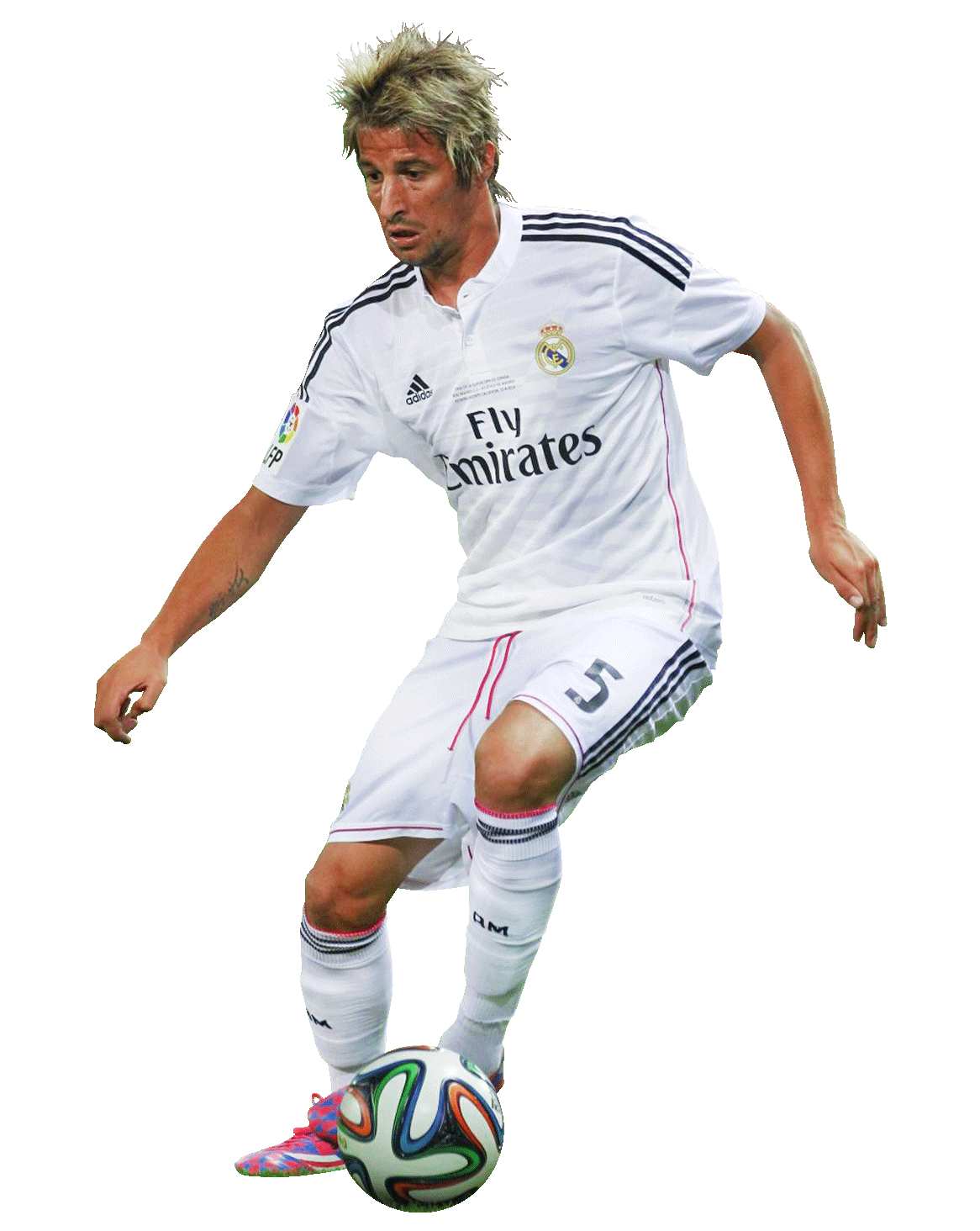

Football
Oct 23' 2025
Celebrating Support & Resilience Fábio Coentrão.
Fábio Alexandre da Silva Coentrão was born on 11 March 1988 in Vila do Conde, Portugal. He grew up in the fishing‐neighbourhood of Caxinas and from an early age was part of a community defined by hard work and the sea. His father, Bernardino Coentrão, worked as a fisherman. His mother is Josefina Serrão. The environment he grew up in instilled values of humility, discipline and persistence - qualities every young athlete needs. Growing up in a working‐class neighbourhood, Coentrão did not have the luxuries many young talents elsewhere might expect. He started his youth career with his hometown club Rio Ave F.C. and made his first senior appearances while the club struggled with relegation and promotion battles. At 16 he was already playing for the senior side. He endured loan spells and had to adapt, proving that the path to the top is not always straight. In July 2007 Coentrão moved to S.L. Benfica at the age of 19, one of Portugal’s top clubs. While at Benfica he worked hard, endured loans to build experience, and eventually became a key left‐back. His breakout season came in 2009-10 when he earned major recognition. On the international front he debuted for the senior Portuguese national team in November 2009. The turn came in July 2011 when Coentrão signed with Real Madrid C.F. for around €30 million. While this was a dream move, it also brought intense competition, injuries and periods when playtime was limited. He had to adapt to a global club, major expectations, and the mental stress that comes with it. His story demonstrates that even after reaching the top, staying there requires resilience. Throughout his career Coentrão faced injuries and challenges: being loaned out, adapting to different positions, and handling the pressure of big transfers. He remained rooted in his early experience: the sea, his father’s fishing boat, the hometown of Caxinas. After retirement he chose to return to his fishing roots and acknowledged how important that background was. For young athletes, the lesson is clear: no matter your level of success, your identity and your discipline matter. Behind Coentrão’s journey were the people who believed in him: his parents, especially his father who introduced him to the sea and taught him hard work; coaches who gave him chances and pushed him; teammates who challenged him. Having meaningful support structures is vital. For young players today, programmes like 8lete can replicate that support: mentorship, structured training, mental resilience coaching and networking. When Coentrão eventually stepped away from professional football, he embraced a second chapter: returning to the sea as a fisherman and even investing in other ventures. His story is not just about football but about transitioning, respecting your roots, and planning for life beyond the pitch. This is a critical message for young athletes: your identity and career go beyond playing days. In early 2025 Coentrão made headlines for being under investigation for an alleged illegal seafood operation in northern Portugal, where over a ton of undocumented seafood was seized. The incident underscores that even champions can face pitfalls when moving into new business arenas, reinforcing that discipline, legality and good support are essential. For young athletes and their support networks, this highlights the need for proper guidance when venturing outside sport. How 8lete can help young players following this blueprint The story of Fábio Coentrão offers several key lessons: humble beginnings do not limit you, support and mentorship matter, setbacks are part of the journey, planning beyond sport is smart, and discipline remains non-negotiable. A platform like 8lete can provide: Mentorship: pairing young athletes with former pros or coaches who understand the journey. Holistic development: physical, technical, mental and career guidance (including life after sport). Support network: community of athletes, coaches and families. Resources: structured training, goal setting, tracking progress and resilience development. Transition planning: helping athletes prepare for what comes after competition. Using these elements, 8lete can help replicate the positive parts of Coentrão’s journey while helping avoid some of the missteps. Fábio Alexandre da Silva Coentrão’s life is a powerful narrative: from a fishing town in Portugal to the heights of club and international football, and then back to his roots. He embodies the notion that talent must be accompanied by work, support, resilience and planning. For young players with dreams, his journey proves it can be done but also that success is multifaceted. With 8lete’s guidance and infrastructure, budding athletes can build their own path: one where humility meets ambition, where roots meet wings, and where every challenge becomes a stepping stone. May his story inspire you to work hard, seek the right support and never forget where you came from. Dream big, stay grounded and let 8lete help you make it real.
READ MORE

